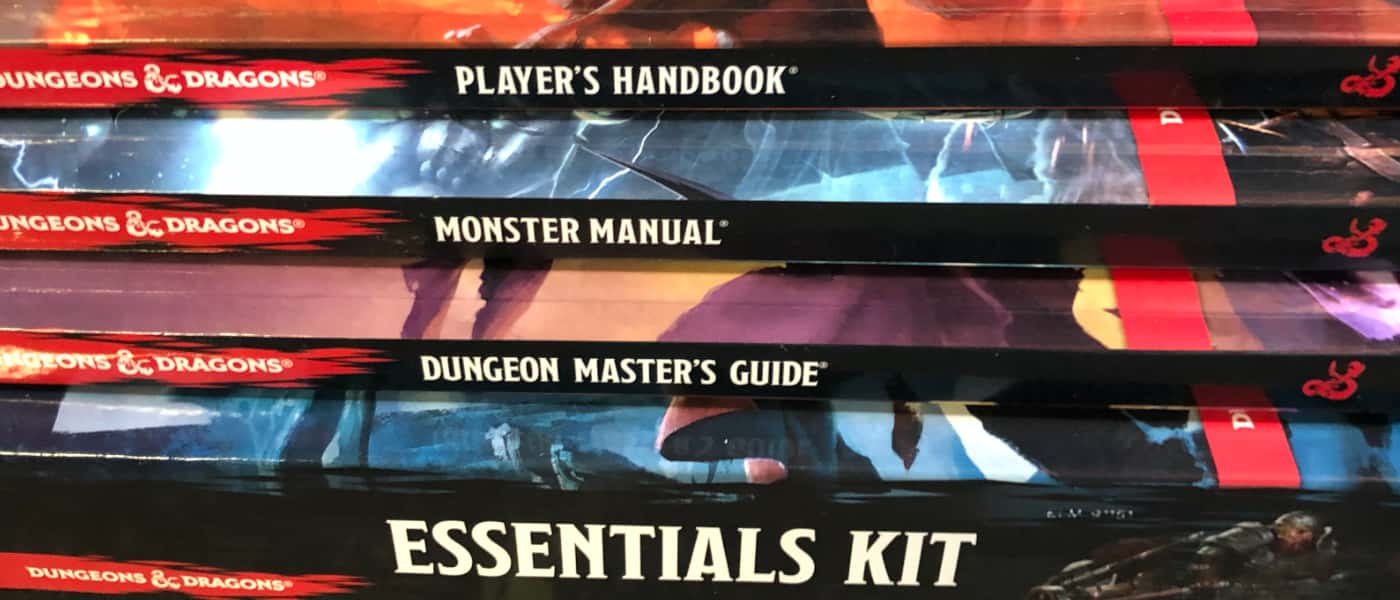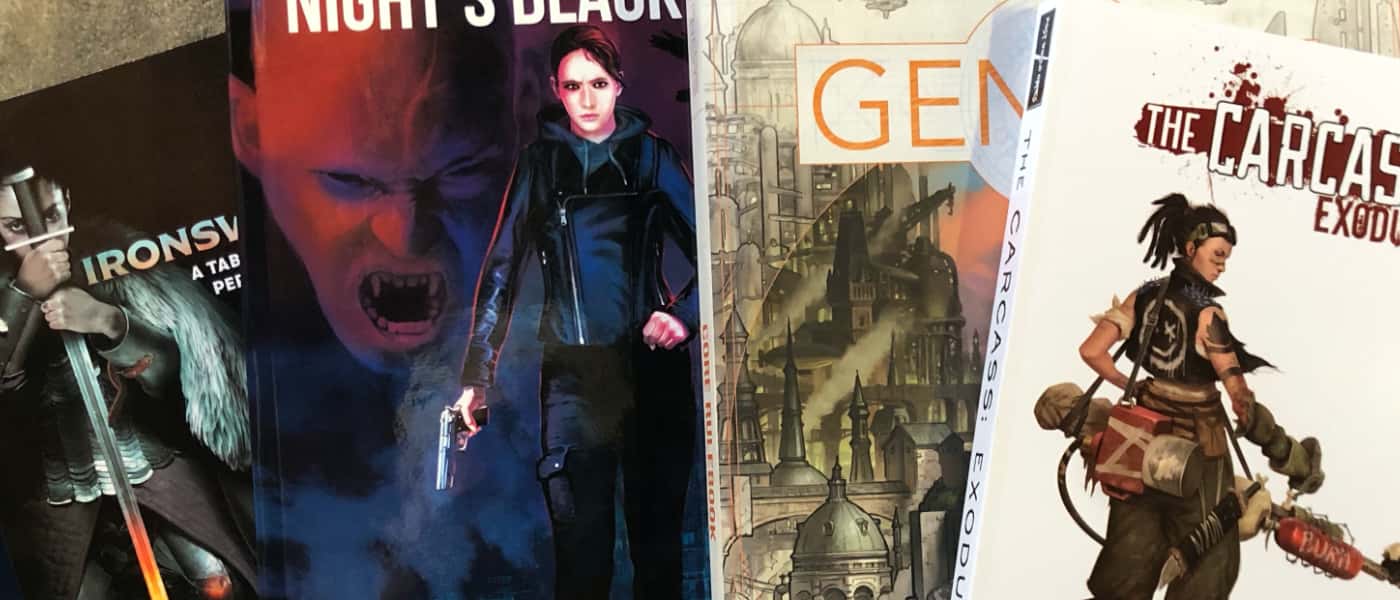Is Fifth Edition D&D Lifting All Boats?
Dungeons & Dragons has always been the most widely-recognized tabletop roleplaying game by far, but its dominance has waxed and waned over the years. Now due to the tremendous market success of Fifth Edition, D&D in some ways stands apart from the rest of the tabletop roleplaying universe. So what are the effects of D&D’s preeminence on the market as a whole?
Is the growth of Dungeons & Dragons expanding the tabletop roleplaying hobby, or is it squeezing out other games? There’s probably no such thing as an unbiased, completely objective answer to this question. But it’s worth exploring this elephant in our room if we’re interested in the long-term health of tabletop roleplaying.

First, it’s useful to remember that the industry — the sales figures and production of new products — is not synonymous with the hobby. The two are intertwined, and sales growth can be used as a rough indicator of expansion of the hobby. But the health of the hobby — the creativity and vitality of play, the profusion of new ideas and replenishing of the participant base — is harder to gauge, and any assessment is inherently subjective.
Second, causality is complicated. It’s tempting to use anecdotal evidence as proof, but the best it can do is provide a hunch, an informed guess. Unfortunately, finding useful hard data about the tabletop roleplaying industry is nearly impossible. Even after years of expansion it’s far too small (an estimated $65M in 2018) to be worth the attention of serious independent market research. To my knowledge only a single tabletop RPG publisher (Hasbro, the parent of Wizards of the Coast) is publicly-traded, and privately-owned companies do not have to provide information to the public about the state of their business. So we’re left sifting through secondary indicators. With that in mind, let’s jump in.
The Tabletop RPG Industry
Let’s examine the business side of the equation first. If Fifth Edition were stealing all the oxygen in the room, we could expect to see its closest competitor Paizo, and second-tier competitors closing up shop. That isn’t happening.
Paizo just released the second edition of Pathfinder. Fantasy Flight Games has followed its extensive Star Wars line with the Genesys generic system and a new version of Legend of the Five Rings. Chaosium has been building out RuneQuest and Call of Cthulhu at a solid clip. Modiphius is handling a dizzying array of licensed products, from Conan to Fallout to Star Trek. Catalyst recently published a sixth edition of the perennially-popular Shadowrun, and Monte Cook Games continues to roll out new Cypher System titles. On the heels of Tales from the Loop, Symbaroum, Mutant: Year Zero, and Forbidden Lands, Free League Publishing bagged the license to produce a new Alien RPG.
Other second-tier and smaller publishers are continuing to release new titles. This doesn’t necessarily mean they’re bringing in higher net revenue, but at the very least they don’t appear to be contracting.

Would these publishers be doing better if Dungeons & Dragons weren’t doing as well? Perhaps. But D&D has been drawing new participants into the hobby, and it’s unclear if any of its competitors are doing the same to a significant degree. Their marketing budgets are much smaller, awareness of these games is much lower, and in over 45 years arguably only a handful of games other than D&D have brought a sizeable chunk of new gamers into the hobby.
From the early days of tabletop roleplaying there have been regional favorites. For example, Das Schwartze Auge has long reigned in Germany. In the big American market, Vampire: The Masquerade is the only game other than D&D that is generally credited with bringing in large numbers of newcomers. It tapped into the vampire-dazzled zeitgeist of the 1990s and offered a very different path into roleplaying.
But in 2019 are any games other than D&D attracting significant numbers to the hobby? This question may have no answer; it’s situated firmly in the Land of Anecdotal Evidence. My guess is that licensed games (FFG’s Star Wars in particular) are creating more than a few new tabletop roleplayers. And stalwarts like Call of Cthulhu and Shadowrun have been attracting new gamers for decades. But is the influx of gamers brought in through these games enough to expand the market significantly?
Maybe. Maybe not.
We just don’t have enough data to know whether these games would be growing the market on their own if D&D weren’t so successful. Which leads me to wonder how much they’re benefiting from D&D’s expansion.
D&D has always been the primary gateway drug for tabletop roleplaying. It’s never been the only way in, but it’s long served as the de facto starting point. Others try D&D, get hooked on it, and don’t feel the need to venture further. Some people try D&D then discover other roleplaying games, either settling on one as a favorite, or bouncing from game to game. But what percentage of people who try D&D actually go on to spend money on other games?
In a hobby as niche as tabletop roleplaying, that number really matters. WotC reports that it sold 300,000 copies of the Dungeons & Dragons Starter Set in 2018. [Warning: Made up numbers for the sake of discussion] If we assume each Starter Set leads three people to try D&D for the first time, that’s 900,000. If 10% of them branch out into one or more other games, that’s 90,000 people entering the broader hobby. If we bump it to 20%, that’s 180,000 people. These are still small numbers, but tabletop roleplaying is a small industry, and it’s social; each new gamer has the potential to add more new gamers.
Some percentage of those who try D&D will eventually get hooked on Apocalypse World, Fate Core, 13th Age, Night’s Black Agents, or one of hundreds of other available games. But I wouldn’t be surprised if that percentage is smaller in 2019 than it was in 2009 or 1999. Here’s why: Over half of D&D newcomers are arriving by way of livestreamed games. That’s a lot.
When they pick up the D&D rules for the first time they have already enaged with Dungeons & Dragons by watching episode after episode of their favorite streaming show(s). In that sense they have something in common with people who enter the hobby via licensed games (Star Wars, Star Trek, etc.) — playing the game is a way of being drawn further into a universe they’ve already embraced. There’s no need to know about other RPGs if the primary purpose of play is further immersion in the already-familiar environment of D&D.

My inherently subjective guess is that D&D is the only game currently drawing large numbers of new gamers into the hobby. Further, I believe it’s also fueling some growth in the broader hobby because some D&D newcomers are trying other games. But the linkage between starting with D&D and exploring other games may not as strong as it was in decades past.
The Tabletop Roleplaying Hobby
If we have no choice but to encroach on the Land of Anecdotal Evidence when thinking about D&D’s effect on the industry, we’re wholly in the Land of Subjective Assessment when thinking about its impact on the hobby.
With that in mind, I don’t think it’s an exaggeration to say that the tabletop roleplaying hobby has never been as vibrant as it is now, and I doubt D&D has much to do with that one way or the other.
If my guesses about the industry are correct, the trickle-down effect of D&D’s growth has helped other games flourish to some degree. But D&D isn’t driving setting or rules innovation; Fifth Edition refactored Dungeons & Dragons rather than rebuilding it. This makes sense, given that Wizards of the Coast knew the potential of the underlying D&D formula. They had no reason to drastically overhaul the game and every reason not to, since the big changes the company introduced in Fourth Edition fractured the D&D user base and gave Pathfinder an opening.
Experimentation and innovation in the tabletop roleplaying hobby has long been fostered by lesser-known publishers, and the explosion of games from small companies and indie developers over the past few years has affected every corner of the hobby. For example, while Fifth Edition didn’t drastically alter theD&Dformula, it did shift the emphasis of the game. Here’s how the Dungeons & Dragons R&D team describes it :
Indie games, and more story-oriented RPGs like the FATE system, influenced the game’s increased emphasis on storytelling and roleplaying. The inspiration system, which rewards players for creating and acting out distinct personalities for their characters, came straight from that approach to design.
The old school renaissance in gaming, a return to the simpler, speedier game designs that gave players and DMs more creative freedom definitely influenced many of our overall design decisions.
Indie designers are multiplying and cross-pollinating, pushing the boundaries of game design, sharing and selling on DriveThru RPG and itch.io. Kickstarter’s labor union controversy casts doubt on the platform’s long-term viability as a supporter of innovative new game development, but it’s funded a tremendous array of new games.
Meanwhile the number of core systems is growing: GUMSHOE, 2d20, Basic Roleplaying, Fate Core, FFG’s narrative dice mechanics, Cypher System, and Free League’s mechanics (to name just a few) each serve as the foundation for multiple games. Meanwhile Powered by the Apocalypse has birthed a staggering array of games, some hewing closely to the system’s core precepts and others deviating quite a bit. And there are countless variations on D&D’s d20 mechanics, made possible by the Open Game License.
The Future of Tabletop Roleplaying
So where does all this leave us? As I’ve mentioned earlier, this entire exercise is fraught with subjectivity. Your analysis may differ, but here’s mine. First, the tabletop RPG industry as a whole appears to be doing well. Second, the hobby is in full flourish. Third, it won’t always be this way.
The future is unwritten, but the past offers us a guide. The excellent Designers & Dragons books catalogue the history of tabletop roleplaying a decade at a time. And after you’ve read them you can’t help but recognize that the tabletop RPG industry is cyclical. It is small, the products it provides wax and wane in popularity, and when the industry contracts, the effects can be brutal on game publishers.
D&D’s effect on the rest of the industry and the hobby is difficult to determine in any objective fashion. But the long-term viability of the industry still seems to hinge on Wizards of the Coast. If Dungeons & Dragons continues to ride high, the rest of the industry will probably continue to chug along nicely. But if D&D’s popularity drops for some reason (brand saturation, a social media firestorm over some D&D livestreamer, Jack Chick’s clone becomes President, you name it), one would hope the rest of the industry would be able to stand on its own two feet.
Ω